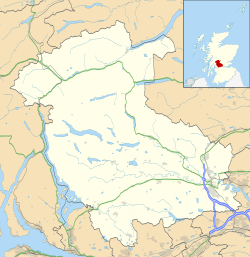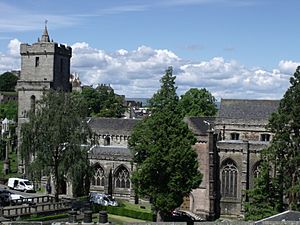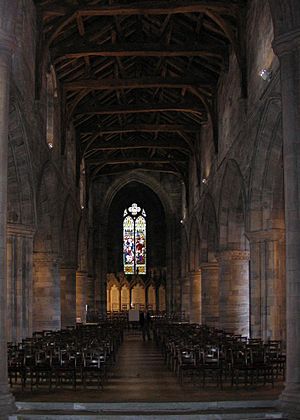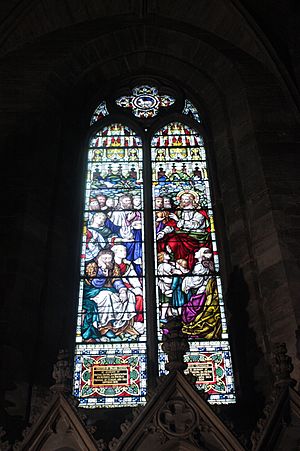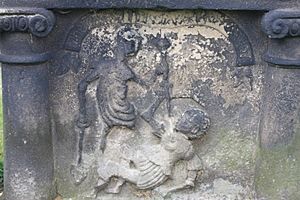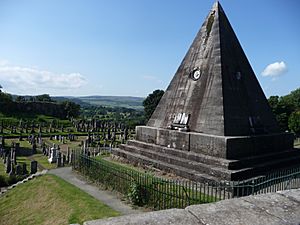Church of the Holy Rude facts for kids
Quick facts for kids Church of the Holy Rude |
|
|---|---|
| The Parish Church of the Holy Rude | |
|
Eaglais na Crois Naoimh
|
|
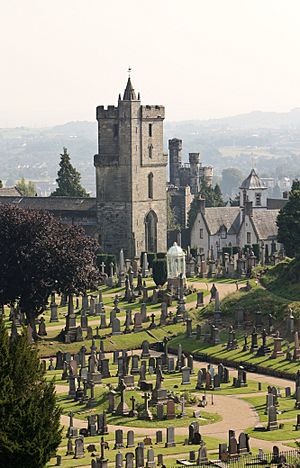
A view from Stirling Castle
|
|
| 56°07′15.1″N 3°56′40.0″W / 56.120861°N 3.944444°W | |
| Location | Stirling |
| Country | Scotland |
| Denomination | Church of Scotland |
| Previous denomination | Roman Catholic |
| Churchmanship | Presbyterian |
| Website | Church Website |
| History | |
| Status | Parish church |
| Founded | 1129 |
| Founder(s) | David I of Scotland |
| Dedication | Holy Cross |
| Architecture | |
| Functional status | Active |
| Style | Gothic |
| Completed | 1530 |
| Specifications | |
| Length | 60.96 m (200 ft 0 in) |
| Number of towers | 1 |
| Tower height | 25.91 m (85 ft 0 in) |
| Bells | 6 |
| Administration | |
| Parish | Stirling |
| Presbytery | Perth |
| Synod | Forth |
The Church of the Holy Rude (which means "Church of the Holy Cross" in Scottish Gaelic) is a very old church in Stirling, Scotland. It's named after the Holy Rood, which was a piece of the cross Jesus was crucified on. The church was first started in 1129 by King David I. However, the oldest parts of the building you see today were built much later, starting in the 1400s.
This makes it the second oldest building in Stirling, right after Stirling Castle. The castle was a favorite home for Scottish kings and queens. Because the church is so close to the castle, it became very important for royal events. It's one of only three churches in Britain where kings and queens have been crowned and are still used today.
Contents
A Journey Through Time
The first church built here in 1129 was destroyed by a fire in 1405. So, a new church was started. Building the main part of the church, called the nave, began around 1414. The roof of the nave was finished sometime between 1440 and 1480.
Work on the chancel, which is the part of the church near the altar, started later in 1507. It was completed around 1530. At the same time, the tall west tower was also made taller.
Royal Connections
One of the most famous events at the Church of the Holy Rude was the coronation of King James VI. He was crowned King of Scots here on July 29, 1567, when he was just 13 months old! A bishop named Adam Bothwell performed the ceremony, and a famous preacher, John Knox, gave a sermon.
Marks of History
If you look closely at the church walls, especially on the north side, you might see some small marks. People think these marks were made by musket balls during a battle in 1651. Soldiers from Stirling Castle might have been practicing their aim by shooting at the church's small windows.
For a long time, the church was actually divided into two separate parts inside. This happened in 1656 because of disagreements among the church members. A wall was built to separate the two groups, and it stayed there until 1936! In 1940, the church was restored, and its beautiful oak beam roof was uncovered again.
In 2023, the church started working with a local tourism group. Their goal is to help more people visit and learn about this amazing historic site.
Other Old Buildings in Stirling
Stirling has many other old buildings with interesting stories. For example, in 1463, a hospital called St James was built near the bridge over the River Forth. Later, a chapel dedicated to St Roque was also built nearby.
King James IV lived a lot in Stirling. He helped create the Collegiate Church of the Chapel Royal, which was known for its fancy musical services. You can also find the ruins of St Mary's Augustinian Abbey of Cambuskenneth nearby. It was founded in 1147 and was very important. Only the church tower remains today. Queen Victoria even placed a monument there for her ancestors, King James III and his Queen, Margaret of Denmark, who are buried at the Abbey.
Beautiful Stained Glass
The Church of the Holy Rude has many stunning stained glass windows. Most of these colorful windows were added in the late 1800s. They were made by famous companies like Ballantine & Co. and Cottier & Co.
The Churchyard
The church has a very old churchyard, or cemetery, mostly to its west and north-west. Some of the gravestones here date back to the 1500s!
In 1851, the churchyard was made bigger, creating the Valley Cemetery to the north. This newer part of the cemetery has statues by Alexander Handyside Ritchie that show important figures from the Reformation period.
One unique gravestone in the old cemetery tells a strange story. It has a carving that shows a historical event involving the theft of a body. In 1822, a woman named Mary Stevenson passed away. Her body was taken from her grave by the local gravedigger and a friend. They were caught, and Mary's body was reburied. The special stone was carved to remember this unusual event.
Many notable people are buried in the old cemetery, including:
- Rev Alexander Beith
- John Cowane, who started Cowane's Hospital
- David Doig
- Professor Henry Drummond
- Rev John Russell, who was mentioned in poems by Robert Burns
- John Elliot Shearer, a historian
The New Cemetery
To the north, near the castle walls, is the newer part of the cemetery. Some people buried here include:
- A. R. W. Allan, an artist
- Charles Henry Greig, an architect
- Irvin Iffla, a cricketer
- Charles Livingstone, an air pilot who died in a plane crash.
Images for kids


